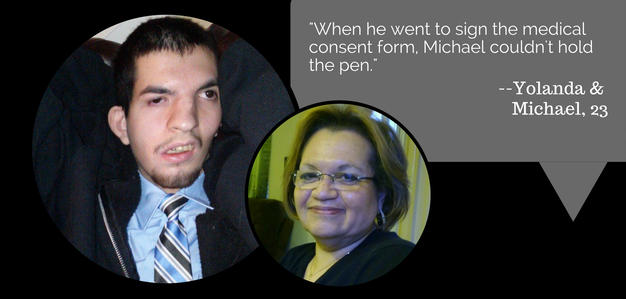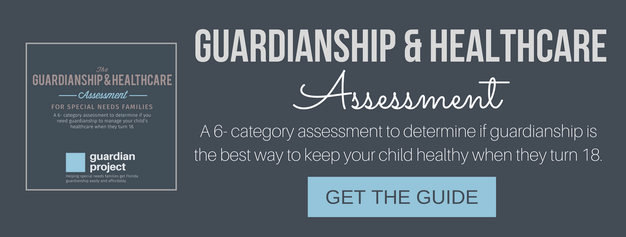Why foregoing guardianship for a child with a developmental disability can result in dangerous medical outcomes.
Michael is 23 years old and has a developmental disability. He is a sweet boy who lives at home with his mom Yolanda. Michael has limited communication skills and is reliant on his parent’s care to meet his basic needs.
After Michael turned 18, Yolanda decided to not pursue guardianship and she continued to parent Michael successfully without it for a several years.
That is, until Michael required emergency surgery for a life threatening medical condition.
The surgery required Michael to see doctors who did not previously know Michael and did not know that Yolanda directed Michael’s medical care.
The new doctors needed Michael to sign a consent form for pre-op bloodwork. On that day, Michael couldn’t hold the pen to sign his name and the surgeon refused to treat him.
Michael and Yolanda’s story is not unusual.
Virginia attorney Lori Murphy tells a similar story about one of her clients, a single mom who is the caretaker of her 24 year old adult son who has a developmental disability. The mom typically directed her son’s medical care, that is until her son needed a new physician.
The new doctor’s office promptly, and correctly, required to know what legal basis the mother had to direct her adult son’s medical care and when the mom could not provide guardianship letters or healthcare proxy, the doctor refused treatment.
Without Guardianship, Your Adult Child with a Developmental Disability Must Make Healthcare Decisions Without Your Assistance
When children turn 18, all decision making authority about their healthcare transfers from the parent to the child. This means that a parent can no longer make healthcare decisions for the child, nor can the parent participate in the child’s healthcare without their consent.
If your child has an intellectual or developmental disability, they may not have the ability to make healthcare decisions on their own. Parents often seek guardianship for their children, which is a judicial proceeding, which gives the parent the right to continue to make healthcare decisions for their child.
The Risks if You Do Not Get Guardianship
Guardianship requires a judicial proceeding, and some families like those in the two stories above, try to get by without it. These parents chose to rely on past history with a medical team to for continued medical treatment. Other parents try to use guardianship alternatives.
This may work for your family, but it’s important for you to fully understand all the risks before making any decisions about your child’s health care. Here are several alternatives to guardianship, and the risk your child may face:
1. Relying on Past Medical Relationships is Dangerous
If a new doctor or specialist is required, they will require evidence that you have the authority to make healthcare decisions for your child. If you do not have anything, your child will be required to consent to a medical procedure.
RISK:
Your child can refuse treatment.
Your child may refuse to allow you to participate in healthcare decisions.
The physician can deny treatment if they find your child does not have capacity to make a medical decision.
2. Getting a Signed Healthcare/Medical Proxy Doesn’t Work
In Florida, a healthcare proxy does not work for parents who seek the authority to make decisions for their child with a developmental disability. The healthcare proxy only comes into effect if the person who gave it (your child) is incapacitated.
RISK:
If a parent is claiming that the child lacks capacity because of their developmental disability, then the child lacks the capacity to enter into it in the first place, making the healthcare proxy would be void on its face.
3. Florida Statutory Medical Proxy Causes Uncertainty
Under the Florida Statutes, a medical proxy can be appointed for a person who is incapacitated or has a developmental disability without requiring any legal action or document. A medical proxy makes healthcare decisions on behalf of someone else who cannot make the decisions for themselves.
RISK:
The statutory medical proxy is not a blanket right. Each physician or hospital visited would make a separate determination as to capacity.
There is no guaranty you will be granted the medical proxy.
Your child’s attending physician — not you and a judge as with guardianship — will evaluate and determine your child’s capacity. If the doctor determines that your child has capacity to make healthcare decisions, they can refuse to grant you the medical proxy and will rely on your child’s choices alone.
Studies Show People with Disabilities Get Substandard Healthcare
Studies show that, people with disabilities, in particular those with developmental and intellectual disabilities, get substandard medical care.
If you you forego guardianship for your child, in addition to requiring your child to make sometimes complex decisions about their own healthcare, you will also be forcing your child to advocate for themselves against a healthcare system that can be biased bias against persons with disabilities.
According to the Disability Rights Education & Defense Fund:
28% of people with disabilities were not covered by their insurance for needed therapies or medications, compared to 7% of people without disabilities.
19% of people with did not get medical treatment needed, compared to 6% of non-disabled people.
Persons with disabilities routinely suffer from dental pain because of difficulties finding dentists who will treat persons with disabilities, in particular those with sensory issues.
The doctor for a patient with a developmental disability who was diagnosed with advanced breast cancer and required surgery implied that, due to her already “low quality of life” (because of her disability), that she did not merit the intervention. Surgery was delayed and the patient died within a year.
Conclusion
While guardianship is a serious solution, involving a court filing, it is the only way to truly ensure that you can continue to participate in the management of your child’s healthcare once they turn 18.
Some families may be able to get by relying on some of the alternatives. But, given the risk to you child’s well-being, and possibility for bias against people with disabilities by the medical profession, careful assessment of your child’s ability should be made before deciding to forego guardianship.
As for Michael and Yolanda, Michael’s primary care physician intervened and convinced the surgeon to perform the surgery. Michael’s mom ended up filing for guardianship the next week based on the doctor’s recommendation.
Click here for more information and a video about guardianship and healthcare.


